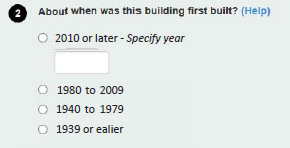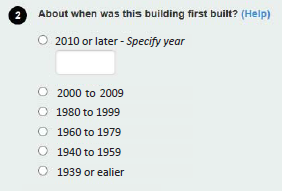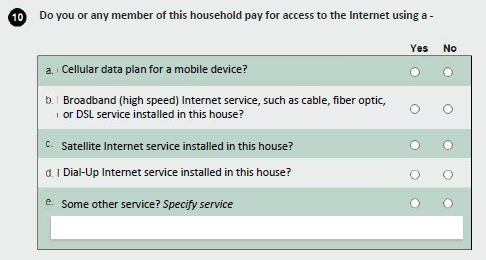Internet Group 1 V Internet Group 1 Version 2
Generic Clearance for Questionnaire Pretesting Research
Attachment E 2016 ACS Respondent Burden Testing_FINALT Protocol_Internet Group 1 Version 2_to CB 042516
2016 American Community Survey Respondent Burden Testing
OMB: 0607-0725
Attachment E: ACS Respondent Burden Testing Protocol, Group 1, Version 2, Internet
Introduction
Hello, my name is ______________ and I work here at Westat. Thank you for taking the time to participate in this research study.
Westat is working to develop new questions for the American Community Survey, which is sponsored by the U.S. Census Bureau. Before surveys are conducted, it’s important to try out questions with the help of people such as yourself. The survey asks questions about you and your household.
It is important that the questions make sense, are easy to answer, and that everyone understands the questions the same way. If you agree to take part in this study, I will hand you the questions to answer as if you were filling them out on a Web survey. Afterwards, I will ask you some questions about the answers you gave. There are no right or wrong answers. Our purpose is not to compile information about you. Instead, your interview along with those of others will show us how to improve these questions for a later survey.
Informed Consent
Before we get started, there are a few things I should mention. This is a research project, and your participation is voluntary. If you prefer not to answer any questions just say so, and you can go on to the next one. It’s also okay if you change your mind after starting and would rather not participate.
All your answers, everything you say, will be kept confidential. We will not use your name in any reports. The interview will take about 40 minutes and you will receive $40. We will also need to audio record our conversation. This helps me so I can listen to what you are saying and won’t have to take a lot of detailed notes while you are talking; it will also help when we write up a summary of this interview. Only project staff will have access to the recording and other project materials, and those materials will be stored according to Title 13 requirements for protecting the identity of individual respondents. {Finally, some of the researchers developing the questions are here today observing our interview to learn if there are things that might need to be changed.}
HAND CONSENT FORMS TO RESPONDENT, This form contains all of the things I just told you about your rights in this interview. Please read it over and sign both copies if you are willing to take part in the study.
HAVE R SIGN TWO CONSENT FORMS, KEEP ONE AND GIVE ONE TO RESPONDENT.
TURN ON RECORDER. The date and time is ____________. Now that the recorder is running, let me ask again, is it okay with you if we record this interview?
Protocol
In a moment, I am going to ask you some questions about your household and then will hand you some questions to answer yourself. I’d like you to answer these questions as you would if you were filling them out in a Web survey. I am going to observe as you answer the questions and will hand you extra pages based on how you answer some of the questions. Also, you will notice that some questions ask about “this building,” which refers to your home, not the building we are sitting in today.
After you have finished answering the questions, we will talk about some of the answers you gave. Before we begin, do you have any questions about the process?
ADMINISTER HOUSEHOLD ROSTER.
AFTER ROSTER IS COMPLETE, HAND RESPONDENT INET_G1_V2_Packet 1 then FOLLOW HOUSING TABLE BELOW TO HAND PAGES TO RESPONDENT.
Housing Table of Instructions
Housing Question |
Answer |
Instructions |
Q8b (Smartphone use) |
Yes |
INET_G1_Packet 2 |
No |
INET_G1_Packet 3b |
|
Q9 (Paid cellular data plan) |
Yes |
INET_G1_Packet 3a |
No |
INET_G1_Packet 3b |
COGNITIVE PROBES
Housing: Q2, INET_G1_V2_Packet 1
Research Questions:
Can respondents provide the exact year their building was first built?
Which alternative version is easier for respondents to understand and answer and why?
Do respondents have any difficulty comprehending the question when the categories are read aloud to them?

Let’s look back at Question 2 about when this building was first built.
Tell me more about your answer.
How confident are you in your answer about when your residence was first built? Say more about that.
What do you think the question meant when it said “first” built?
What reaction, if any, do you have to the grouping of years in the categories?
How easy or difficult was it to choose a year range? What made it easy/difficult?
IF RESPONDENT FILLED IN A YEAR: How easy or difficult was it to recall the exact year your residence was built? What made it easy/difficult?
COMPARE ALTERNATE VERSION (Q2):
I’d like to present you with another way the question might be asked. (HAVE R ANSWER Q2 IN INET_G1_V1_Packet 1)

[SHOW BOTH VERSIONS OF Q2 TO RESPONDENT] Does one of these seem easier to answer than the other? What makes you say that?
Now we will focus on the questions about computers, phones and internet use.
COMPUTING DEVICES: Q8a,B, INET_G1_V2_Packet 1
Research Questions:
How easy or difficult do respondents with and without smartphones find the Telephone/Computer/Internet questions to answer and why?
Do respondents correctly understand and use this terminology for their computing devices?


Let’s look at Question 8a. IF YES, Tell me what devices you were thinking of when you answered yes. IF NO, Can you give me some examples of these kinds of devices?
Now let’s look at Question 8b.
IF YES, Tell me about those smartphones. IF NEEDED, What makes them a smartphone?
IF NO, What kind of phone or phones do you or anyone in your household own or use? In your mind, what is a “smartphone”?
SMARTPHONE PAID PLAN: Q9, INET_G1_Packet 2
Research Questions:
How easy or difficult do respondents with and without smartphones find the Telephone/Computer/Internet questions to use and why?

Now let’s look at Q9. What made you say {yes/no}?
IF NEEDED: How are you able to access the Internet from your smartphone? Do you have to be in a WiFi area to access the Internet, or do you have a wireless network like 3G or 4G?
(IF YES) Can you explain to me what your “paid cellular data plan” is?
(IF NO) What do you think is meant by a “paid cellular data plan”?
INTERNET ACCESS: Q10a-f, INET_G1_PACKET 3A or 3B
Research Questions:
How easy or difficult do respondents with and without smartphones find the Telephone/Computer/Internet questions to use and why?
Do respondents understand this item relates to Internet access they pay for?
Do respondents find item 8a repetitive if they responded that they do not have a smartphone, or a data plan for their smartphone?
What “other” responses do respondents provide? Specifically, are those who said “yes” at Q7 also reporting their smartphone data plan in “other”?
What terminology is used to talk about how people access the Internet?

Now let’s look at Question 10. Tell me more about how you connect to the Internet in your home.
This question asks about whether you or any member of this household “pay for access to the Internet.” What does “pay for access to the Internet” mean to you?
IF NEEDED (FOR ITEMS WHERE R ANSWERED YES): Do you pay for that service or not?
IF NEEDED AND IF Q9=YES OR Q10A=YES: Suppose you did not have to pay for internet access in your home, for example, if you rent an apartment where it is provided for free in the building. How would you have answered for [YES RESPONSES TO Q10A-F]?
In your mind, do any of these ways of accessing the Internet seem the same or similar? [IF YES] Which ones? Are you unfamiliar with any of them?
What did you think of "cable, fiber optic, or DSL service" as examples of broadband or high speed Internet? Are you unfamiliar with any of those examples?
[IF QUESTION 9=NO] Earlier you said “no” to Question 9 about whether any of the smartphones used by you or any member of this household have a paid cellular data plan for accessing the Internet. Then Question 10 asked “Do you or any member of this household pay for access to the Internet using a cellular data plan for a mobile device.” How are these two questions the same or different?
[IF NEEDED: IF Q9=NO AND Q10A=YES] Tell us more about why you answered these two questions differently.
IF QUESTION 11 WAS ASKED IN PACKET 3B, CONTINUE. ELSE GO TO CLOSING SECTION
Phone access: Q11, INET_G1_Packet 3b
Research Questions:
How easy or difficult do respondents with and without smartphones find the Telephone/Computer/Internet questions to use and why?

Let’s look at Question 11 now. Please describe the different ways that members of your family make phone calls from your household. NOTE LANGUAGE R USES AND TYPES OF SERVICES MENTIONED.
When the question said to include calls using cell phones, landlines, or other phone devices, what were you thinking about when it said “other phone devices”?
Closing and Incentive
IF OBSERVERS ARE PRESENT, CHECK TO SEE IF THEY HAVE FURTHER QUESTIONS.
Those are all the questions I have for you. Is there anything we haven't discussed that you would like to mention?
DISCUSS ANY RESPONDENT COMMENTS.
Thank you for your time.
STOP
TAPE RECORDER.
GIVE INCENTIVE AND HAVE RESPONDENT SIGN RECEIPT.
2016
ACS Respondent Burden Testing Protocol: Internet, Group 1, Version
2
| File Type | application/vnd.openxmlformats-officedocument.wordprocessingml.document |
| File Title | [Introduction will be developed as part of the materials |
| Author | Westat |
| File Modified | 0000-00-00 |
| File Created | 2021-01-28 |
© 2026 OMB.report | Privacy Policy